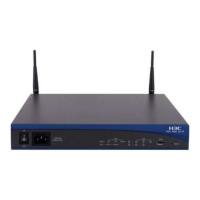8.3.4 Checking the Configuration
Prerequisite
The configurations of VPLS convergence are complete.
Procedure
l Run the display admin-vsi binding [ admin-vsi vsi-name ] command to view the binding
relations between the mVSI and the service VSIs.
----End
Example
Run the display admin-vsi binding command. If information about the binding relations
between the mVSI and all service VSIs are displayed, it means that the configuration is
successful.
<Quidway> display admin-vsi binding
Admin-vsi Service-vsi
--------------------------------------------
admin-vsi1 biz-vsi1
biz-vsi2
8.4 Configuring BFD for VSI PW
If a BFD session is bound to the mVSI PW, you can monitor the service VSI by monitoring the
status of the mVSI PW.
8.4.1 Establishing the Configuration Task
Before configuring BFD for VSI PW, familiarize yourself with the applicable environment,
complete the pre-configuration tasks, and obtain the required data. This can help you complete
the configuration task quickly and accurately.
Applicable Environment
In the VPLS convergence MAN solution, you can establish multiple service VSI PWs and bind
them to an mVSI PW. In this manner, if a BFD session is bound to the mVSI PW, you can
monitor the service VSI only by monitoring the status of the mVSI PW.
Pre-configuration Task
Before configuring BFD for VSI PW, complete the following task:
l Establishing an mVSI PW correctly
NOTE
BFD for the VSI PW uses the default multicast IP address as the peer IP address, and this BFD session
must be established on the mVSI PW because only the mVSI PW can process multicast BFD packets.
Data Preparation
To configure BFD for VSI PW, you need the following data.
Quidway S7700 Smart Routing Switch
Configuration Guide - VPN 8 VPLS Convergence Configuration
Issue 01 (2011-07-15) Huawei Proprietary and Confidential
Copyright © Huawei Technologies Co., Ltd.
807

